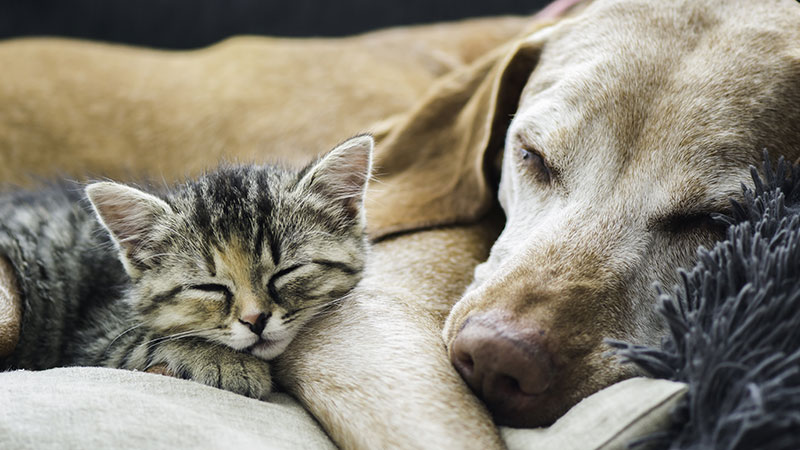Despite the fact that tens of millions of Americans own cats, just around 1 in 4 pet owners identifies as a “cat person.” That’s partially because cats are somehow more mysterious than dogs. Over the centuries, cats have inspired countless myths and misconceptions. Some of these are harmless. Few people today, for example, subscribe to the Ancient Egyptian idea that cats have nine lives. And, while black cats remain an iconic piece of Halloween iconography, only the very superstitious will avoid their company on October 31st.
Some myths, however, still persist and have a decidedly negative impact. Many have given the species a bad reputation, convincing even animal lovers that cats are unfriendly or aggressive. Others have convinced owners to make dangerous or misguided pet parenting decisions.
Cats are not affectionate
Perhaps the most common misconception about cats is that they’re loners. Animal Planet host Jackson Galaxy says the idea persists because people tend to look at cats “through dog-colored glasses.” What he means is that, oftentimes, people try to judge cats by the same standards as dogs. Dogs and cats are two very different species that are bound to exhibit very different behaviors. Just because a cat is less likely to demand your attention doesn’t mean it doesn’t enjoy your attention and affection. Your cat may, in fact, show its feelings toward you in a number of subtle ways.
Cats are not trainable
This is another area where cats suffer from direct comparisons to dogs. It’s true that cats are generally more independent-minded than dogs and that their willfulness can make training them frustrating. All it takes is a little patience and positive reinforcement.
Cats are nocturnal
Cats can see in low-light conditions far better than humans. Many pet cats use that ability to their advantage, getting up to mischief while their owners try to sleep. Strictly speaking, cats are “crepuscular” creatures. This means they’re typically most active and alert at dawn and dusk. While cats can’t navigate total darkness, these times of day offer an ideal level of light.
Cats don’t get along with dogs
The entertainment world is largely to blame for this myth. Cats and dogs are accepted as mortal enemies because that’s how artists tend to depict them on stage and screen. While multi-pet households certainly see their fair share of scuffles, the sheer number of them suggests that dogs and cats are perfectly capable of getting along. Careful introductions and supervised socialization go a long way in promoting peace between the species.
Cats should drink milk
Leaving out a saucer of milk for a stray or sharing a glass with your pet may seem harmless. In fact, you might mistakenly believe that milk is a healthy treat for cats. While they’ll happily endulge, adult cats typically have trouble digesting dairy products. They lack the enzymes necessary to break milk down and suffer many of the same symptoms as lactose intolerant people -- diarrhea, bloating, and other digestive concerns.
Cats always land on their feet
Any cat owner can attest to their pet’s impressive acrobatic skills. After watching your cat leap and bound across the house, you might really believe that they’ll always land on their feet. It’s true that cats have a flexible spine, as well as what veterinarians call a “righting reflex.” Both help cats perform death-defying feats, but many urban cat parents know that this reflex is imperfect.
So many city-dwelling cats have tumbled from fire escapes and open windows that veterinarians have developed a term for these falls: high-rise syndrome (HRS). Vets believe that HRS (and the accompanying sprains and fractures) may result from unconsciousness movements during deep sleep. Cat owners in multi-level buildings should keep cats away from open windows and ensure each of their windows is fitted with a screen. A conversation with your veterinarian about pet insurance can provide additional peace of mind.
Cats are low-maintenance pets
Your cat won’t need several walks each day, but that doesn’t mean cat ownership is easy. Providing the appropriate level of care requires consistent effort and a close collaboration with a trusted veterinarian. Remember that cats require affection and feel separation anxiety too -- even if they don’t make it obvious. You should still look into pet insurance to protect your cat, and should ensure your cat visits their vet at least once a year for a wellness exam.

